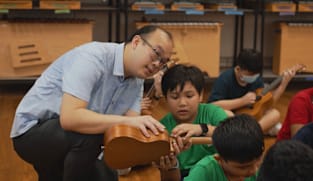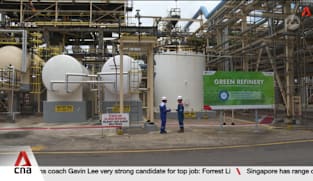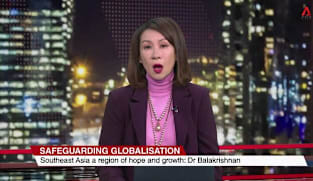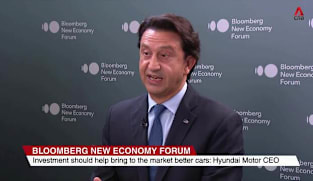Lawrence Wong on Singapore’s COVID-19 response
Singapore has done well in protecting both lives and livelihoods throughout the COVID-19 pandemic on the whole, compared to other countries. Giving this assessment in Parliament on Monday (Mar 20), Deputy Prime Minister and Finance Minister Lawrence Wong noted that the healthcare system, though strained, was never overwhelmed; Singapore’s fatality rate was among the lowest in the world and its vaccination rate, among the highest; and the Government spent money and implemented measures - including through legislation - to cushion workers, businesses and individuals from the worst impact of the crisis and prevent mass unemployment. Singapore’s policies and actions in responding to the pandemic distinguished it from other countries, said Mr Wong. It kept its air and sea ports open even when other parts of the world shut down, enhancing its reputation as a trusted node that could be relied on. Its population also rallied together and emerged more united than before. The Deputy Prime Minister put on record the Government’s appreciation to all who contributed to the COVID-19 fight and a contingent of frontline warriors was honoured in the House. Meanwhile, Singapore wants to draw lessons from the crisis, with the Government recognising that there were things that could have been done better. Mr Wong said these have been highlighted in the White Paper on Singapore’s COVID-19 response, to be “forthright and transparent” so that Singapore can learn from its experience. He acknowledged that some early responses fell short because so little was known about the virus at the time. These included the handling of outbreaks in migrant worker dormitories, the initial guidance on mask-wearing, safe management measures which were at times too finely calibrated, complicated to follow and difficult to implement, as well as border controls. Mr Wong distilled three broad lessons that Singapore should take away to be better prepared for the next pandemic. First, fortifying its public health system - where he announced that the country will set up a dedicated centre for public health, similar to the Centres for Disease Control in other nations, to consolidate capabilities and expertise. Second, enhancing forward planning capabilities to better anticipate what is to come, develop a course of action and pivot more effectively. And third, strengthening Singapore’s resilience by building up buffers and being nimble enough to move fast when the unexpected occurs. This will include giving further thought to enhancing the resilience of public infrastructure, especially for major new projects like the Tuas mega port and Changi Airport Terminal 5, as well as being able to repurpose existing spaces at short notice into facilities that can be used to meet emergency needs in a crisis. Mr Wong noted that an integral part of Singapore’s national resilience is its financial reserves, which enabled the country to respond effectively and bounce back quickly in the pandemic. He said the reserves must be used prudently and judiciously so that future generations can continue to benefit from them.
Singapore has done well in protecting both lives and livelihoods throughout the COVID-19 pandemic on the whole, compared to other countries. Giving this assessment in Parliament on Monday (Mar 20), Deputy Prime Minister and Finance Minister Lawrence Wong noted that the healthcare system, though strained, was never overwhelmed; Singapore’s fatality rate was among the lowest in the world and its vaccination rate, among the highest; and the Government spent money and implemented measures - including through legislation - to cushion workers, businesses and individuals from the worst impact of the crisis and prevent mass unemployment. Singapore’s policies and actions in responding to the pandemic distinguished it from other countries, said Mr Wong. It kept its air and sea ports open even when other parts of the world shut down, enhancing its reputation as a trusted node that could be relied on. Its population also rallied together and emerged more united than before. The Deputy Prime Minister put on record the Government’s appreciation to all who contributed to the COVID-19 fight and a contingent of frontline warriors was honoured in the House. Meanwhile, Singapore wants to draw lessons from the crisis, with the Government recognising that there were things that could have been done better. Mr Wong said these have been highlighted in the White Paper on Singapore’s COVID-19 response, to be “forthright and transparent” so that Singapore can learn from its experience. He acknowledged that some early responses fell short because so little was known about the virus at the time. These included the handling of outbreaks in migrant worker dormitories, the initial guidance on mask-wearing, safe management measures which were at times too finely calibrated, complicated to follow and difficult to implement, as well as border controls. Mr Wong distilled three broad lessons that Singapore should take away to be better prepared for the next pandemic. First, fortifying its public health system - where he announced that the country will set up a dedicated centre for public health, similar to the Centres for Disease Control in other nations, to consolidate capabilities and expertise. Second, enhancing forward planning capabilities to better anticipate what is to come, develop a course of action and pivot more effectively. And third, strengthening Singapore’s resilience by building up buffers and being nimble enough to move fast when the unexpected occurs. This will include giving further thought to enhancing the resilience of public infrastructure, especially for major new projects like the Tuas mega port and Changi Airport Terminal 5, as well as being able to repurpose existing spaces at short notice into facilities that can be used to meet emergency needs in a crisis. Mr Wong noted that an integral part of Singapore’s national resilience is its financial reserves, which enabled the country to respond effectively and bounce back quickly in the pandemic. He said the reserves must be used prudently and judiciously so that future generations can continue to benefit from them.



















